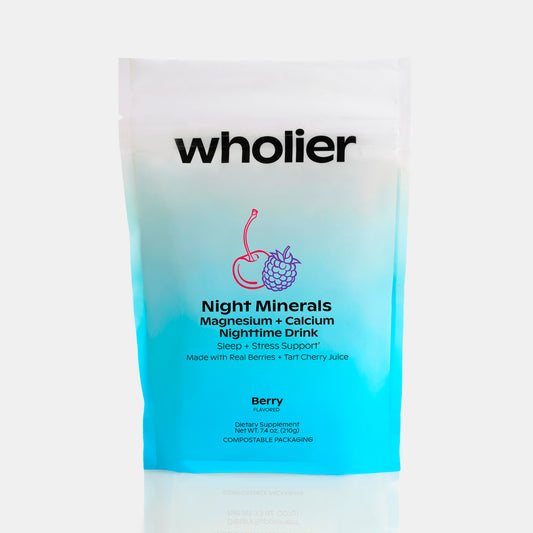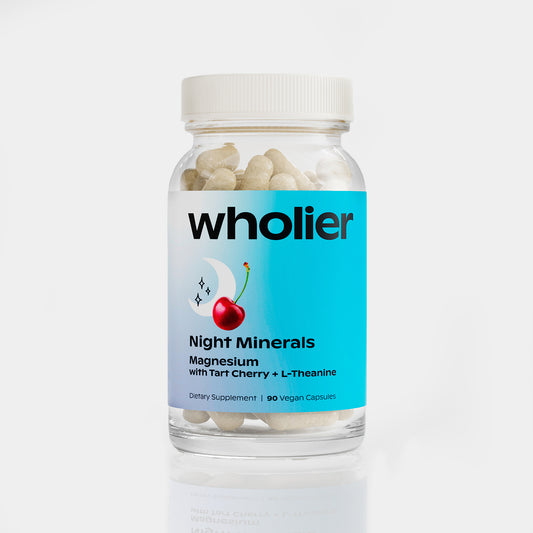
Magnesium Citrate vs. Glycinate: Which Form Is Best for You?
Dive into the key differences between these two prevalent forms of magnesium and uncover their distinct advantages.
Magnesium is an essential mineral that plays a crucial role in over 300 biochemical reactions in our body.(1) It supports nerve and muscle function, maintains a steady heartbeat, regulates blood sugar levels, and helps in the production of protein, bone, and DNA.(2) Magnesium is a vital nutrient, and many people don't get enough of it in their diets.(3) Thankfully, there are various forms of magnesium supplements available to help us meet our daily requirements. Two popular forms are magnesium citrate and magnesium glycinate. But how do they compare, and which one is best for you?
Why Are There Different Forms of Magnesium and What Are the General Benefits?
Magnesium comes in different forms, each bound to a different molecule, which influences its absorption, bioavailability, and specific benefits.(4) Bioavailability refers to how well a substance is absorbed by the body and utilized for its intended purpose. In the case of magnesium, higher bioavailability means more magnesium is absorbed, leading to better results.(5)
The general benefits of magnesium include:
- Better sleep: Magnesium helps relax muscles and nerves, promoting restful sleep.(6)
- Stress reduction: Magnesium can help reduce stress by regulating the stress hormone cortisol.(7)
- Muscle function: Magnesium is essential for proper muscle function, including preventing muscle cramps.(8)
- Heart health: Magnesium helps maintain a regular heartbeat and prevents abnormal heart rhythms.(9)
- Bone health: Magnesium supports calcium absorption, which is essential for strong bones.(10)
What is Magnesium Citrate?
Magnesium citrate is a combination of magnesium and citric acid. It is commonly used as a gentle laxative and can help alleviate constipation.(11) Magnesium citrate is known for its relatively high bioavailability, making it an effective form for raising magnesium levels in the body.(12) The laxative properties are beneficial for those looking to maintain regularity with a natural supplement.
What is Magnesium Glycinate?
Magnesium glycinate is formed by combining magnesium with the amino acid glycine. This form of magnesium is known for its high bioavailability and gentle effect on the digestive system.(13) Magnesium glycinate is less likely to cause gastrointestinal side effects than other forms of magnesium, making it a popular choice for those with sensitive stomachs or bowel issues.(14) Additionally, the glycine in magnesium glycinate may provide additional benefits, such as promoting relaxation and supporting a healthy sleep cycle.(15)
What's the Difference Between Magnesium Citrate and Magnesium Glycinate, and Which One is Better?
The main difference between magnesium citrate and magnesium glycinate lies in their molecular composition and their specific effects on the body. Magnesium citrate has laxative properties for individuals looking to alleviate constipation and promote digestion.(16) On the other hand, magnesium glycinate is known for its calming effects and is ideal for those seeking relaxation and improved sleep.(17)
In terms of bioavailability, both magnesium citrate and magnesium glycinate are considered highly absorbable.(18) However, magnesium glycinate may have a slight edge due to its gentler effect on the digestive system and its potential additional benefits from glycine.(19)
So, which one is better? The answer depends on your individual needs and preferences. If you're looking to address constipation, magnesium citrate might be your best choice. If you're seeking relaxation and improved sleep, magnesium glycinate may be the better option.
Can I Find a Supplement That Has Both Magnesium Citrate and Magnesium Glycinate?
Yes, you can find supplements that combine both magnesium citrate and magnesium glycinate, including our Night Minerals Magnesium + Calcium Nighttime Drink. By choosing a supplement with both forms, you can experience the unique benefits of each while ensuring optimal magnesium absorption.
Sources:
(1) de Baaij, J. H. F., Hoenderop, J. G. J., & Bindels, R. J. M. (2015). Magnesium in man: implications for health and disease. Physiological Reviews, 95(1), 1-46.
(2) Ibid.
(3) Rosanoff, A., & Dai, Q. (2021). Suboptimal magnesium status in the United States: are the health consequences underestimated? Nutrition Reviews, 70(3), 153-164.
(4) Schuchardt, J. P., & Hahn, A. (2017). Intestinal Absorption and Factors Influencing Bioavailability of Magnesium-An Update. Current Nutrition & Food Science, 13(4), 260-278.
(5) Ibid.
(6) Abbasi, B., Kimiagar, M., Sadeghniiat, K., Shirazi, M. M., Hedayati, M., & Rashidkhani, B. (2012). The effect of magnesium supplementation on primary insomnia in elderly: A double-blind placebo-controlled clinical trial. Journal of Research in Medical Sciences, 17(12), 1161-1169.
(7) Sartori, S. B., Whittle, N., Hetzenauer, A., & Singewald, N. (2012). Magnesium deficiency induces anxiety and HPA axis dysregulation: Modulation by therapeutic drug treatment. Neuropharmacology, 62(1), 304-312.
(8) Nielsen, F. H., & Lukaski, H. C. (2006). Update on the relationship between magnesium and exercise. Magnesium Research, 19(3), 180-189.
(9) Del Gobbo, L. C., Imamura, F., Wu, J. H., de Oliveira Otto, M. C., Chiuve, S. E., & Mozaffarian, D. (2013). Circulating and dietary magnesium and risk of cardiovascular disease: a systematic review and meta-analysis of prospective studies. American Journal of Clinical Nutrition, 98(1), 160-173.
(10) Castiglioni, S., Cazzaniga, A., Albisetti, W., & Maier, J. A. M. (2013). Magnesium and osteoporosis: current state of knowledge and future research directions. Nutrients, 5(8), 3022-3033.
(11) Marken, P. A., Weart, C. W., & Gums, J. G. (1989). Magnesium citrate-bisacodyl regimen proves better than castor oil for colonoscopic preparation. Journal of Clinical Gastroenterology, 11(3),
(12) Schuchardt, J. P., & Hahn, A. (2017). Intestinal Absorption and Factors Influencing Bioavailability of Magnesium-An Update. Current Nutrition & Food Science, 13(4), 260-278.
(13) Coudray, C., Rambeau, M., Feillet-Coudray, C., Gueux, E., Tressol, J. C., Mazur, A., & Rayssiguier, Y. (2005). Study of magnesium bioavailability from ten organic and inorganic Mg salts in Mg-depleted rats using a stable isotope approach. Magnesium Research, 18(4), 215-223.
(14) Supakatisant, C., & Phupong, V. (2015). Oral magnesium for relief in pregnancy-induced leg cramps: a randomised controlled trial. Maternal & Child Nutrition, 11(2), 139-145.
(15) Yang, H., Shan, W., & Zhu, F. (2020). Effects of glycine on sleep quality: A systematic review and meta-analysis of randomized controlled trials. Sleep Medicine Reviews, 55, 101382.
(16) Marken, P. A., Weart, C. W., & Gums, J. G. (1989). Magnesium citrate-bisacodyl regimen proves better than castor oil for colonoscopic preparation. Journal of Clinical Gastroenterology, 11(3), 286-289.
(17) Yang, H., Shan, W., & Zhu, F. (2020). Effects of glycine on sleep quality: A systematic review and meta-analysis of randomized controlled trials. Sleep Medicine Reviews, 55, 101382.
(18) Schuchardt, J. P., & Hahn, A. (2017). Intestinal Absorption and Factors Influencing Bioavailability of Magnesium-An Update. Current Nutrition & Food Science, 13(4), 260-278.
(19) Coudray, C., Rambeau, M., Feillet-Coudray, C., Gueux, E., Tressol, J. C., Mazur, A., & Rayssiguier, Y. (2005). Study of magnesium bioavailability from ten organic and inorganic Mg salts in Mg-depleted rats using a stable isotope approach. Magnesium Research, 18(4), 215-223.






